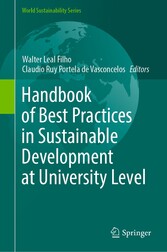This book gives a special emphasis to state-of-the-art descriptions of approaches, methods, initiatives, and projects from universities, stakeholders, organizations, and civil society across the world, regarding cross-cutting issues in sustainable development.
There is a perceived need for mobilizing the various stakeholders when attempting to promote sustainability in higher education and to promote best practices, which may inspire further initiatives. But despite this need, there are a few publications handling this matter in a coherent way. In order to meet the pressing need for publications which may document and disseminate examples of best practice on sustainable development at university level, the 'Handbook of Best Practices in Sustainable Development at University Level' is being published.
This book is produced by the European School of Sustainability Science and Research (ESSSR), through the Inter-University Sustainable Development Research Programme (IUSDRP) and contains inputs from authors across all geographical regions.
The book also discusses examples of initiatives coordinated by universities but involving civil society, the private sector, and public sector (including local, national, and intergovernmental bodies). In particular, it describes practical experiences, partnerships, networks, and training schemes for building capacity aimed at fostering the cause of sustainable development at institutions of higher education.
Thanks to its design and the contributions by experts from various areas, it provides a welcome contribution to the literature on sustainable development, and it may inspire further works in this field.













